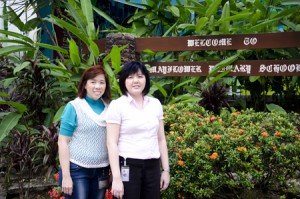Young Children’s Voices in Mathematical Problem Solving
Contributed by Dr Ho Siew Yin and Sng Wei Qin Abbie, from NTUC First Campus, for SingTeach Virtual […]
Read More
After Mayflower Primary School had successfully developed an approach to help high-progress pupils realize their potential, the teachers turned their attention towards helping every child in the school by exploring innovative pedagogies to improve their engagement.
Mayflower Primary School (MFPS) teachers Miss Teo Swee Huang and Mrs Jessie Ching previously shared with SingTeach (Developing Students with Potential, Issue 38) how they had spearheaded a programme for high-progress (HP) pupils.
Three years later, we caught up with them for SingTeach’s 10th anniversary issue, to find out the progress of their programme.

Mrs Jessie Ching (left) and Miss Teo Swee Huang believe that every child has the potential to learn.
The Découvrez (“discovery” in French) approach was designed to support teachers in using differentiated instruction to teach HP pupils both within and outside curriculum time. Over the years, this approach has evolved with other tiered programmes to provide differentiation to meet the needs of not just HP pupils, but various ability groups, notes Swee Huang.
While pupils are often grouped by grades, Swee Huang comments that children are made up of more than such letters.
“In the current banding system, there is a spectrum, or a broad range of abilities among the pupils. Within each band there’s some diversity that can bring about the richness of learning in class,” she says.
“We wanted to emphasize other skills, like reasoning and communication skills, which are not always defined by grades alone,” she continues. “Having that diversity in class will help them learn from one another.”
During the initial stages of the Découvrez approach, a HP committee was formed to gather like-minded teachers dedicated to the needs of HP pupils. This committee has since been dissolved and replaced by planning sessions done within departments and during Structured Timetabled Time (STT).
“Teachers will meet regularly for an hour every week to do team planning,” says Jessie. “Other than just having the lesson plan, we are also looking into innovative pedagogies to engage children in the classroom.”
We wanted to emphasize other skills, like reasoning and communication skills, which are not always defined by grades alone. Having that diversity in class will help them learn from one another.
– Teo Swee Huang, Mayflower Primary School
One such innovative pedagogy that MFPS teachers have adopted is Teaching Through the Arts Programme (TTAP).
This arts-based pedagogy makes use of arts elements, such as drama strategies and creative movement, to engage children in academic subjects during curriculum time.
Through collaboration and discussion between teachers and teaching artists supported by the National Arts Council, learning outcomes are achieved through integrating these two disciplines in the best and most meaningful way possible, elaborates Jessie.
The lessons designed by teachers and artists provide more opportunities for children to reason and communicate with one another, and with the teacher.
“It has helped the pupils learn cold and hard concepts in very interesting ways that appeal to them,” explains Jessie.
Swee Huang adds, “The students construct their own understanding through all these learning experiences, rather than being spoon-fed.”
It is hoped that through such innovative pedagogies, children can develop into confident and collaborative learners, in line with the transdisciplinary nature of 21st century competencies.
The school recognizes that professional development of teachers is key to seeding innovative pedagogy to stretch the potential of every child.
However, they both acknowledge it is not an easy process.
“Time is always a challenge,” admits Jessie. “We need to prioritise what we want to do with the limited time we have.”
“Instead of having teachers to meet outside STT, we make use of our regular professional learning time to make this a priority.” This way, all teachers will benefit from learning how to differentiate instruction for all pupils.
“Manpower is very fluid,” continues Jessie. It is not sustainable to just have a fixed group of people doing it.”
“The programmes are thus spread across the whole school to make it more pervasive and sustainable,” she says. New teachers are inducted and immersed into the system through lessons observation and mentoring.
For Swee Huang and Jessie, the benefits of Découvrez and TTAP are apparent to them. Other teachers comment on the higher engagement among their pupils. “The children are able to think more deeply, and communicate their reasoning more clearly,” shares Swee Huang.
“Every child should be given an opportunity to realise their fullest potential,” she continues. “That’s why the school strives to meet the needs of every child.”
“We don’t just focus on particular groups of children,” adds Jessie. “Much like every school is a good school, every child has the potential to learn.”